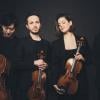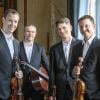
Music unites, so they say, but historically not for the Jerusalem Quartet, whose concerts have been boycotted, protested, and even canceled. Might San Francisco give a warmer welcome?
Indeed: The ensemble’s concert on Thursday, Nov. 7, presented by San Francisco Performances, went uninterrupted, even if the atmosphere felt tense. Two days after the elections, the modest audience in the San Francisco Conservatory of Music’s Caroline H. Hume Concert Hall could set aside politics, if only for an evening, and judge the performance on its own terms.
The ensemble had an apt introduction in Haydn’s Quartet in B-flat Major, Op. 50, No. 1. The composer wrote this short and affable work for King Friedrich Wilhelm II of Prussia, who played the cello whenever he could. The lowest voice in Haydn’s score has an interesting part, but still, it takes a group effort to make this music special.

Not every experiment in this performance of the piece went smoothly. In the minuet, for example, some of the more creative articulations backfired when the notes failed to speak. But when things clicked — as in the violins’ canon at the end of the same movement, a fierce competition for both softness and strength — it was thrilling. Best of all was the warm, graceful first movement, where it was most apparent that violinists Alexander Pavlovsky and Sergei Bresler and cellist Kyril Zlotnikov have played together for 30 years. (Violist Ori Kam joined the group in 2011.)
Some 200 years after Haydn’s time, 12-tone music had arrived in Russia, and in his String Quartet No. 12, Op. 133, Dmitri Shostakovich ventured a response. With a distinctive sequence that meanders through all 12 pitches of the chromatic scale, he teases out each section of the work, which in the end largely affirms the supremacy of the triad. Only tonality isn’t much of a comfort when the theme’s intervals are this claustrophobic, the key is D-flat major, and the instruments wear mutes. Ironically, it was the dull pizzicato later in the piece — hard-edged and yet gorgeously vibrated by Pavlovsky — that rang.
Zlotnikov, playing against type, imbued the tonally ambiguous cello line with a rare romanticism. In fact, this theme sounds eerily similar to the melody of another massively wrought Opus 133 quartet: Beethoven’s Grosse Fuge. Further allusions make Shostakovich’s major-key sections feel weighted with the past, even as the music bursts forth — as it did throughout the Soviet composer’s final period, a productive one especially for chamber music, the medium that attracted the least scrutiny from government censors. And yet there they are in the music, trilling like annoying animatronic birds. The ending may sound like a fanfare, but you can’t in good conscience celebrate.
Three cheers, then, for Antonín Dvořák, whose music concluded Thursday’s program on a sunnier note. Like Shostakovich, Dvořák composed prolifically during the last decade of his life. Unlike Shostakovich, the Czech composer had a pretty good life. His biggest problem was that he missed his family while staying in the United States during that fateful period that yielded the some of his best-known works. So he came home and, happily ensconced, wrote his String Quartet No. 13 in G Major, Op. 106.
At first, the piece is exuberant. But just when the end is in sight, Dvořák pulls back. Specters of the previous movements float in, and the music comes full circle in a larger sense: by realizing the ambitious structural goal toward which the composer had worked in his first quartets, which are so diffuse they’re almost never played. These moments could have been breathtaking if it weren’t for the tuning — which throughout the evening wasn’t strong — and expression — which was so exaggerated that even the music’s truths rang false.




